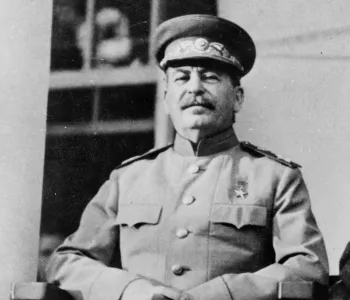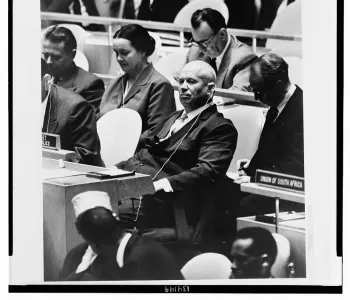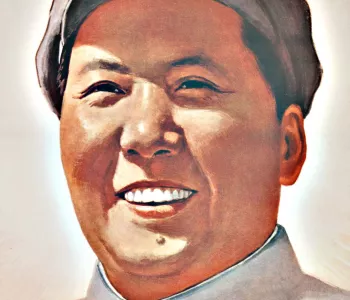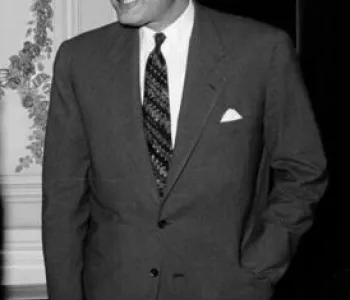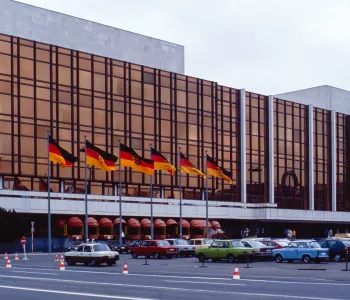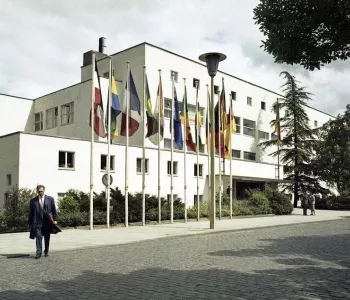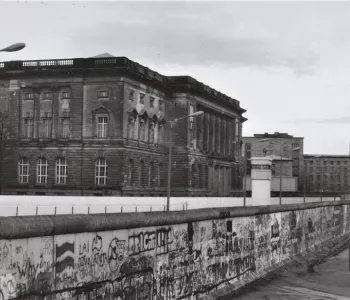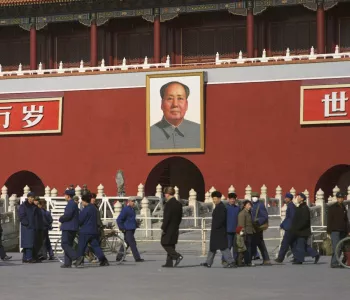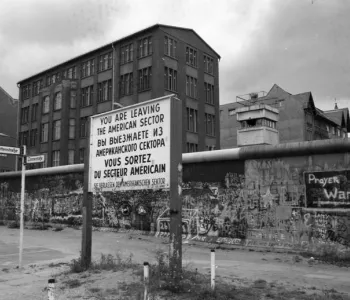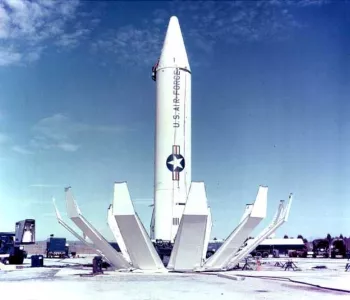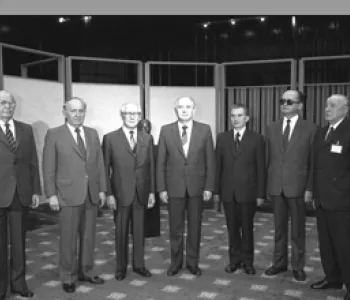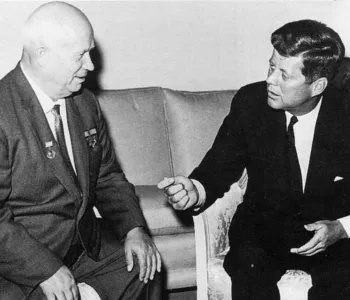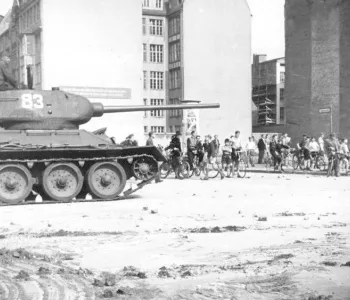d'Vinci

Ulbricht, Walter
Leader of East Germany from 1950-1971.

b. June 30, 1893 - d. August 1, 1973
Walter Ulbricht was a hardline communist and acted as the head of East Germany until 1971 when he was forced to retire. Ulbricht spent WWII in exile in the USSR, and returned following the war as the most influential German communist.
Walter Ulbricht was a hardline communist and acted as the head of East Germany until 1971 when he was forced to retire. Ulbricht spent WWII in exile in the USSR, and returned following the war as the most influential German communist.
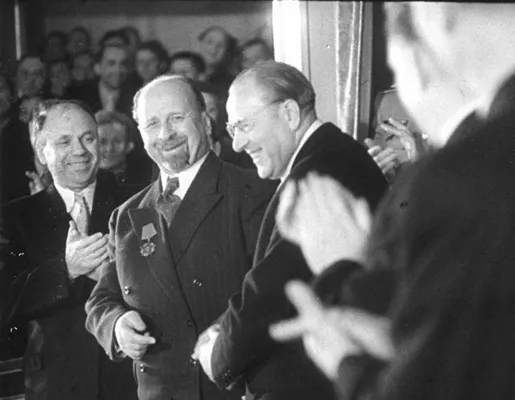
Image, Ulbricht and Otto Grotewoh are awarded the Order of Karl Marx of the GDR, 1953, Bundesarchiv Bild 183-19634-0001.
Born on June 30, 1893, in Leipzig to working-class parents, Walter Ulbricht was trained as a cabinet maker after attending public school for only eight years. He joined the Socialist Workers Youth movement in 1908, and in 1912 he became a member of the Socialist Party of Germany (SPD), the start of a 50-year career as a leftist activist and politician. At the start of World War I he joined the radical wing of the SPD in criticizing the party's approval in the Reichstag of war credits. In 1915 Ulbricht was called up for service, and until his desertion in 1918 he fought in the German army. During the war he also became a member of the left radical Spartakus League, the precursor of the German Communist Party (KPD). Ulbricht was one of the founding members of the KPD's Leipzig organization in early January 1919.
Between 1920 and 1923 Ulbricht occupied various regional offices in the KPD, distinguishing himself through tireless organizing work. His early activities earned him the nickname "Comrade Cel" -- an apparatchik with, by all accounts, an ice-cold personality. In 1922 he made his first trip to Moscow, where he shook hands with Lenin. Later in life, when dealing with Soviet officials too young to have known Lenin, he rarely missed an opportunity to remind others of his seniority in the communist movement. During the 1920s Ulbricht rose quickly through his party's ranks. In 1928 he became a member of the Reichstag. That year he also became a candidate member of the Comintern's executive committee, necessitating frequent, politically valuable travel to Moscow. He became a faithful executor of Stalin's will, most evidently in 1932 when as KPD leader in Berlin he ordered communist cooperation with the Nazis against the faltering German democracy.
When Hitler came to power in 1933, Ulbricht went underground, and next was active in KPD organizations in Paris and Prague. In 1935 he went to live in Moscow, where he spent most of his time until the final weeks of World War II. It speaks to his identification with the Stalinist system that where other prominent foreign communists perished in Stalin's purges, Ulbricht survived and by 1945 had become the most influential German communist.
In April 1945, Ulbricht returned to Germany at the head of a Soviet-controlled advance group of German communists. The following year he and his comrades maneuvered themselves into the political driver's seat in Soviet-occupied Germany. They forced the Soviet zone SPD into a merger with the KPD -- to form the Socialist Unity Party of Germany (SED) -- and became Moscow's primary tool for policymaking in the zone. Ulbricht was the spider in the SED web and, after the establishment of the German Democratic Republic (GDR) in the Soviet zone, also the prime policymaker in East Germany. His power seemed in peril during the GDR crisis in 1953, when the population rose in opposition to the communist regime, but ultimately Moscow could not find a credible alternative among the SED leadership. After fighting off another internal challenge to his position in 1956-1957 Ulbricht ruled supreme. In 1961 he convinced Soviet leader Nikita Khrushchev that in order to secure the survival of the GDR the regime needed to build a wall in Berlin, sealing off West Berlin.
In spite of the fact that this did stabilize the GDR to some extent, Ulbricht never succeeded in turning his country into an economic success. When, by the late 1960s, Moscow and other SED leaders began to show an interest in establishing closer economic ties with the West, particularly West Germany, the time had come for Ulbricht to retire. This he was forced to do in 1971. Ulbricht died at age 80 on August 1, 1973, in Dollnsee, near Berlin.
Born on June 30, 1893, in Leipzig to working-class parents, Walter Ulbricht was trained as a cabinet maker after attending public school for only eight years. He joined the Socialist Workers Youth movement in 1908, and in 1912 he became a member of the Socialist Party of Germany (SPD), the start of a 50-year career as a leftist activist and politician. At the start of World War I he joined the radical wing of the SPD in criticizing the party's approval in the Reichstag of war credits. In 1915 Ulbricht was called up for service, and until his desertion in 1918 he fought in the German army. During the war he also became a member of the left radical Spartakus League, the precursor of the German Communist Party (KPD). Ulbricht was one of the founding members of the KPD's Leipzig organization in early January 1919.
Between 1920 and 1923 Ulbricht occupied various regional offices in the KPD, distinguishing himself through tireless organizing work. His early activities earned him the nickname "Comrade Cel" -- an apparatchik with, by all accounts, an ice-cold personality. In 1922 he made his first trip to Moscow, where he shook hands with Lenin. Later in life, when dealing with Soviet officials too young to have known Lenin, he rarely missed an opportunity to remind others of his seniority in the communist movement. During the 1920s Ulbricht rose quickly through his party's ranks. In 1928 he became a member of the Reichstag. That year he also became a candidate member of the Comintern's executive committee, necessitating frequent, politically valuable travel to Moscow. He became a faithful executor of Stalin's will, most evidently in 1932 when as KPD leader in Berlin he ordered communist cooperation with the Nazis against the faltering German democracy.
When Hitler came to power in 1933, Ulbricht went underground, and next was active in KPD organizations in Paris and Prague. In 1935 he went to live in Moscow, where he spent most of his time until the final weeks of World War II. It speaks to his identification with the Stalinist system that where other prominent foreign communists perished in Stalin's purges, Ulbricht survived and by 1945 had become the most influential German communist.
In April 1945, Ulbricht returned to Germany at the head of a Soviet-controlled advance group of German communists. The following year he and his comrades maneuvered themselves into the political driver's seat in Soviet-occupied Germany. They forced the Soviet zone SPD into a merger with the KPD -- to form the Socialist Unity Party of Germany (SED) -- and became Moscow's primary tool for policymaking in the zone. Ulbricht was the spider in the SED web and, after the establishment of the German Democratic Republic (GDR) in the Soviet zone, also the prime policymaker in East Germany. His power seemed in peril during the GDR crisis in 1953, when the population rose in opposition to the communist regime, but ultimately Moscow could not find a credible alternative among the SED leadership. After fighting off another internal challenge to his position in 1956-1957 Ulbricht ruled supreme. In 1961 he convinced Soviet leader Nikita Khrushchev that in order to secure the survival of the GDR the regime needed to build a wall in Berlin, sealing off West Berlin.
In spite of the fact that this did stabilize the GDR to some extent, Ulbricht never succeeded in turning his country into an economic success. When, by the late 1960s, Moscow and other SED leaders began to show an interest in establishing closer economic ties with the West, particularly West Germany, the time had come for Ulbricht to retire. This he was forced to do in 1971. Ulbricht died at age 80 on August 1, 1973, in Dollnsee, near Berlin.
